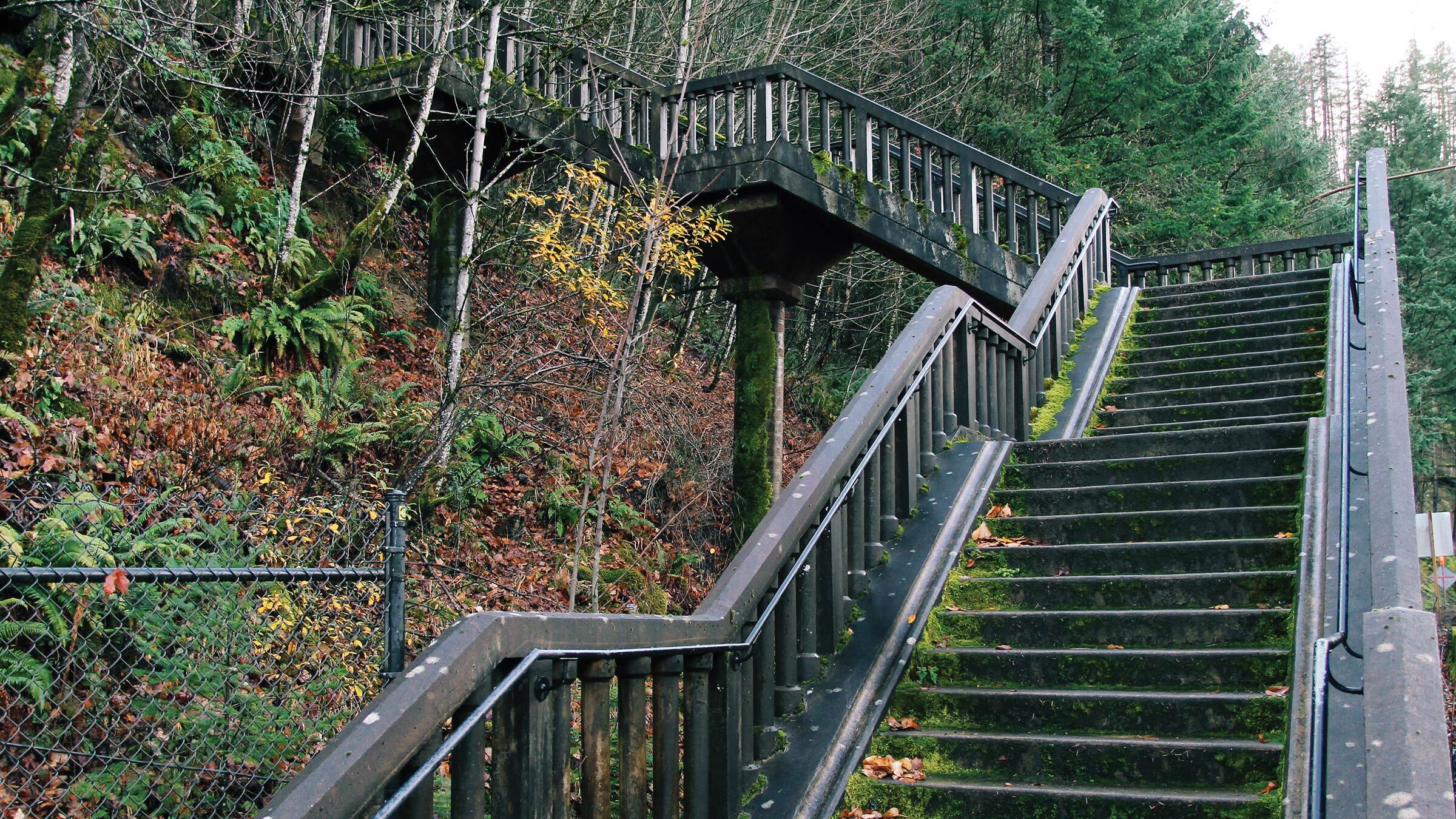Like many Portland cyclists, Rebecca Berry, 70, had enjoyed pedaling scenic trails in the Columbia River Gorge for years.
Even after chronic back trouble and a series of surgeries, Berry continued riding, though now she pedals a recumbent trike with an electric assist.
But the Historic Columbia River Highway State Trail presents an obstacle impossible for her and many others to surmount.
Halfway down the more than 12 miles of paved pathway near Bonneville Dam, the trail turns abruptly into a 40-foot staircase.
"It's paved right up to the staircase, and then you just stand there and look down and say, 'There is no way,'" says Berry. "And then it's paved all the way from the bottom of the staircase on. It's heartbreaking because it's such a wonderful trail."
The trail was closed for more than a year to everyone after the Eagle Creek Fire. The stairs are briefly closed again after a small landslide. While it's closed, Berry has renewed the fight to make the state of Oregon comply with federal law requiring the trail to be accessible for her and other cyclists with disabilities.
A legal expert says Berry is right about the law.
"There is no viable argument that the state of Oregon can deny persons with disabilities access to the trail because of their disabilities," says LouAnn Pearthree, a retired civil rights lawyer, who has volunteered to assist Berry. "It is not as if the state can say, 'It's all right that the Historic Columbia River Highway State Trail is inaccessible because we provide a similar accessible opportunity elsewhere.' There is none other like it."
Berry and Pearthree are hoping the state will take corrective steps without being sued. But if officials reopen the trail again without first addressing the accessibility shortcoming, they say they might bring legal action.
It's not clear how much it would cost the state to fix the problem now. Ten years ago, the Oregon Parks and Recreation Department estimated replacing the stairs would cost roughly $2.5 million.
The Historic Columbia River Highway State Trail, constructed from remnants of an early-20th-century scenic motorway, opened in 1996 as a linear state park. It included more than 12 miles of paved pathway weaving through the Gorge.
The stairs are even a problem for many able-bodied users. Anyone riding a tandem bicycle, pushing strollers, pulling trailers, or traveling with anything cumbersome to carry faces an obstacle.
When the path was being built, the Oregon Department of Transportation, which handled construction of the path for the state parks system, faced an engineering challenge: a sizable drop at the end of the original historic highway path segment where the new highway cut through below.
They chose a stairway—in violation of federal law, Berry says.
The Americans with Disabilities Act, passed in 1990, requires public facilities to be accessible for everyone.
A 1995 ODOT memo shows the project team had considered building a ramp rather than stairs, but rejected the idea because of "high visual impacts and costs."
Parks officials referred questions about the stairs to ODOT. The transportation department insists there was no violation of the federal law.
"At that time, the ADA requirements were not mandatory," says ODOT spokesman Don Hamilton. "In consultation with the Oregon Disabilities Commission, we emphasized other elements of the trail."
Pearthree says ODOT is wrong: Any new construction after Jan. 26, 1992, was indeed subject to the strictest requirements of ADA.
In 2013, Berry filed an ADA complaint against the state with the U.S. Department of the Interior. Nothing happened.
Kevin Gorman, executive director of Friends of the Columbia Gorge, says private funders are probably not the answer.
"It's really hard to go and get funding to fix a mistake that was done with previous government funding versus doing something new," Gorman says.
ODOT's Hamilton says his agency will replace the stairs some day, but the timeline is uncertain.
"It is definitely in our plans, but we don't have it where it needs to be," says Hamilton.
Pearthree say Oregon Parks and Recreation must take its ADA responsibilities seriously in the Gorge and at all state facilities.
"They have this interactive map where they say, 'Find the parks with accessible facilities,' and it just turns out to be restrooms," Pearthree says. "There's a handful of trails. How many of your parks actually offer opportunities for people with disabilities to interact with nature?"

